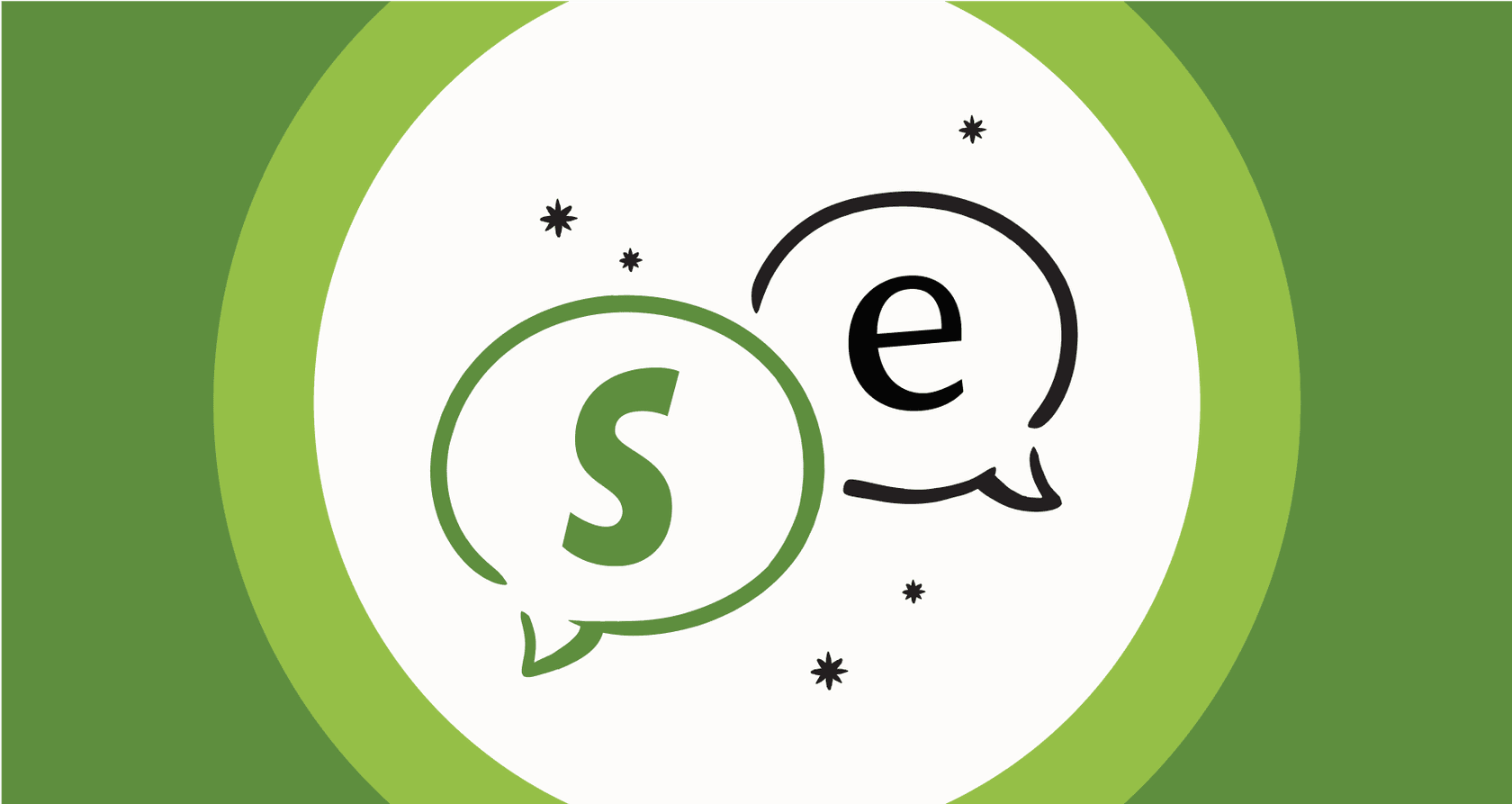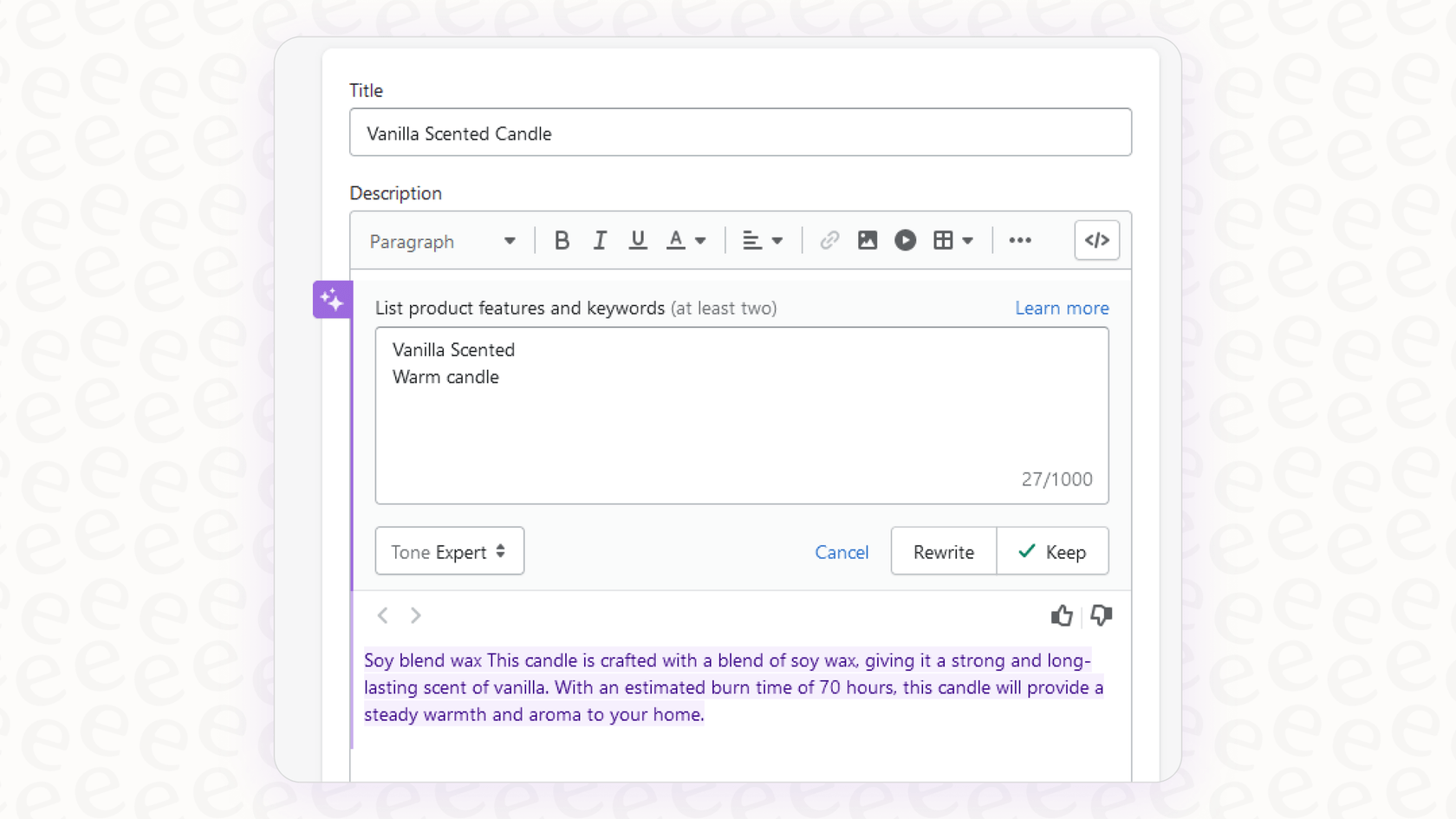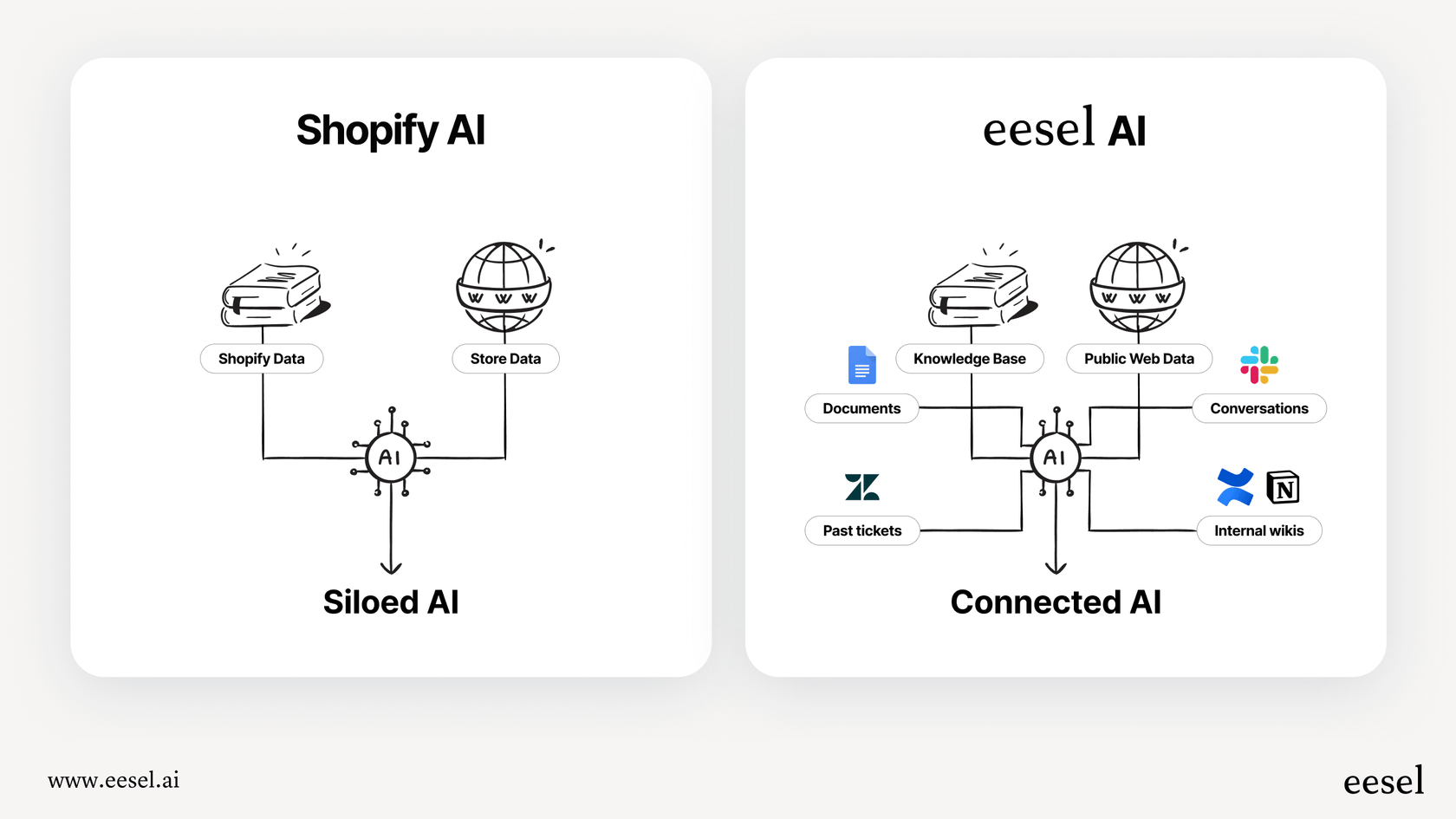Shopify Sidekick conversational prompting: A complete 2025 overview

Stevia Putri

Stanley Nicholas
Last edited November 6, 2025
Expert Verified

If you run a Shopify store, you’ve probably noticed that little starburst icon for Sidekick that’s popped up in your admin panel. It’s clear Shopify is going all-in on AI, and Sidekick is their new co-pilot, designed to help you run your business using simple, conversational commands. It can whip up product descriptions, dig into sales data, and even help you tweak your store’s theme.
But while it's a slick tool for merchants, what can it really do? And more importantly, what are its limits, especially when you start thinking about automating customer support?
Let's take a real look at Shopify Sidekick Conversational Prompting. We’ll walk through its key features, see where it starts to fall short, and talk about how a dedicated AI platform can help you scale your support in ways a built-in assistant just can't.
What is Shopify Sidekick Conversational Prompting?
At its core, Shopify Sidekick is an AI-powered assistant that lives right inside your Shopify admin. It's built on Shopify Magic, the company's suite of AI tools, and has been trained on a massive amount of e-commerce data, plus all the specific data from your own store.
The whole idea is to let you manage your store by just talking to it. Instead of clicking through a bunch of menus, you can simply ask Sidekick to do things for you. You can ask it, “Show me my best-selling products from last month,” or “Draft a product description for my new line of candles.”
It’s meant to be your business consultant, content writer, and data analyst all rolled into one. It makes some of Shopify’s powerful features a lot more accessible, letting you get things done right within your daily workflow.
What you can do with Shopify Sidekick Conversational Prompting
Sidekick is more than just a simple chatbot; it’s a flexible tool built to handle a lot of the day-to-day grind for a Shopify merchant. Let's break down what it's good at.
Creating content and marketing materials
One of the first things you'll notice is its knack for writing. Most store owners spend a ton of time on copy, but with Shopify Sidekick Conversational Prompting, you can get a solid draft in a few seconds.
-
Product descriptions: Just give it a few keywords, and Sidekick can write a pretty compelling description that hits all the key features.
-
Email campaigns: You can ask it to write a welcome email for new customers or an announcement for a weekend flash sale.
-
Blog posts: If you give it a topic, it can generate a basic blog post to help with your store's SEO and give you a starting point for your content marketing.

Analyzing your business and reports
Let’s be honest, digging through analytics dashboards can make your eyes glaze over. Sidekick makes this a lot easier by letting you ask questions about your store's performance in plain English.
-
Sales trends: Ask something like, "Summarize why my sales dipped last week." Sidekick can look at your data and point to potential reasons, like a drop in traffic or a lower conversion rate.
-
Product performance: A question like, "Which products have the highest return rate?" can help you quickly spot quality control issues or maybe just product photos that are setting the wrong expectations.
-
Customer segmentation: You can tell it to, "Create a segment of customers who have bought from me more than three times." Then you can use that list for a targeted marketing campaign.

Editing your store and theme
If you’re not a developer, making changes to your store's theme can feel a bit daunting. Sidekick makes some of the basic tweaks much more approachable. You can ask it to:
-
"Add a featured products section to my homepage."
-
"Change my store's main color to a dark green."
-
"Create a banner for our summer clearance sale."
It’s not going to handle complex custom coding, but for quick and simple layout changes, it's a handy tool that can save you from having to hire a developer.
The limitations of Shopify Sidekick Conversational Prompting for support automation
While Sidekick is a great helper for you, the merchant, it was never really built to be an autonomous, customer-facing support agent. If you're looking to automate and scale your customer service, you'll run into its limitations pretty quickly.
Stuck inside the Shopify ecosystem
Sidekick knows your Shopify store inside and out, but that’s where its expertise ends. The reality is, your company's actual knowledge is probably scattered across a dozen different places.
-
External knowledge gaps: It can’t check your internal wikis in Confluence, your policy documents in Google Docs, or the troubleshooting guides your team has built from past support tickets. This means it can't answer more complex customer questions that need information from outside of Shopify.
-
A fragmented view: Without a single, unified source of truth, you’re left with an AI that only has part of the picture. This leads to half-answers and a lot of frustrated "let me get a human for you" moments.

A truly helpful AI support agent needs to learn from all your company knowledge, no matter where it is. This is where you'd need a tool that can connect everything, which is what platforms like eesel AI are built for. They integrate with dozens of sources, from your help desk to internal docs, creating one brain for your AI to use.
A lack of customizable workflows and actions
Good customer support isn't just about answering questions; it's about solving problems. Sidekick can tell you things about your store, but it can't actually interact with other systems to resolve issues for your customers.
-
No external API calls: It can't look up an order status in your shipping provider's system, process a return through your logistics software, or check a warranty status in your CRM.
-
Limited help desk actions: It isn’t designed to work with help desks like Zendesk or Gorgias to automatically tag tickets, send them to the right team, or close them out once a problem is solved.
This is a big difference with a dedicated AI support platform. With eesel AI, for example, you can build custom actions that let your AI agent look up information and perform tasks in any external system. This turns it from a simple Q&A bot into an agent that actually gets things done.
No way to test or simulate before going live
Letting an AI talk to your customers is a big step, and you want to be sure it's going to do a good job. Sidekick doesn't give you a way to test its performance before you start relying on its suggestions. You just use it in real-time and hope it works out.
In contrast, eesel AI has a simulation mode that lets you test your AI agent on thousands of your past support tickets. You can see exactly how it would have answered, find gaps in its knowledge, and get a solid forecast of your automation rate before a single customer ever talks to it. This lets you roll out automation confidently, without risking your customer experience.

Pricing and real value
One of the best things about Shopify Sidekick is the price: it’s included for free with all Shopify plans. There are no extra fees, which makes it a super accessible way for any merchant to start playing with AI.
For a solo entrepreneur or a small team, this is a fantastic deal. It gives you some powerful content and analytics tools that can save you hours of work, all without any extra cost.
But as your store grows, it’s worth thinking about the "hidden costs" of its limitations. The time your team spends handling all the support tickets that Sidekick can't automate starts to add up. The lack of deep integrations means you might find yourself paying for other tools or just throwing more human hours at the problem to fill the gaps.
While "free" is a great price to start, a growing business needs a solution that can grow with it. This is where a dedicated platform with clear, predictable pricing can be a smarter investment. For instance, eesel AI offers straightforward pricing plans based on usage, not on how many tickets it resolves, so your costs don't suddenly jump during your busiest seasons.
Go beyond Shopify Sidekick Conversational Prompting with a true AI support agent
Shopify Sidekick is an excellent assistant for you, the merchant. But your customers and your support team deserve an expert of their own. For stores that are serious about providing instant, accurate, 24/7 support, a dedicated AI platform like eesel AI for Shopify is the natural next step.
Here’s how it picks up where Sidekick leaves off:
-
Unify all your knowledge, instantly: Don't just train your AI on your product catalog. With eesel AI, you can connect your help center, past tickets, internal docs, and more. It automatically learns your brand voice and your specific solutions, so it can provide answers with much greater depth and accuracy.
-
Automate support with total control: Go beyond just answering questions. With eesel AI’s workflow engine, you can build custom actions to look up order details, tag tickets in your help desk, and escalate to the right agent when it makes sense. You get to decide exactly what gets automated, so you can start small and expand when you're ready.
-
Go live in minutes, not months: Setting up a powerful, customer-facing AI shouldn't require a whole development team. With one-click integrations for Shopify, Zendesk, Gorgias, and others, you can get a fully functional AI agent up and running in a few minutes, all on your own.

| Feature | Shopify Sidekick | eesel AI |
|---|---|---|
| Primary User | Merchant | Customer & Support Agent |
| Knowledge Sources | Shopify Data Only | Shopify, Help Desk, Confluence, GDocs, Slack & 100+ more |
| Custom Actions | No (Limited to Shopify admin tasks) | Yes (API lookups, ticket tagging, routing) |
| Simulation Mode | No | Yes (Test on historical tickets) |
| Primary Goal | Help the merchant run the store | Automate customer support and assist agents |
Shopify Sidekick Conversational Prompting: What's the verdict?
Shopify Sidekick is a genuinely useful tool that puts some impressive AI capabilities in the hands of every merchant. For creating content, getting quick data insights, and making simple store edits, its conversational interface is a huge time-saver.
But when it comes to customer support, it’s a co-pilot for you, not an automated agent for your customers. To really scale your support, cut down on response times, and free up your team for more important work, you need a tool that was built specifically for that job.
Ready to see what a dedicated AI support agent can do for your Shopify store?
Try eesel AI for free and build your first AI agent in minutes.
Frequently asked questions
Shopify Sidekick is an AI-powered assistant integrated directly into your Shopify admin, leveraging Shopify Magic. Its primary goal is to help merchants manage their store more efficiently by accepting simple, natural language commands for various business operations.
You can use it to generate marketing content like product descriptions, email campaigns, and basic blog posts. It also assists with business analysis by summarizing sales trends, identifying product performance, and helping segment customers, in addition to making minor theme edits.
While highly beneficial for merchant tasks, Shopify Sidekick has significant limitations for customer support automation. It cannot act as an autonomous, customer-facing agent due to its confinement to Shopify data and lack of external system integrations for resolving complex issues.
Shopify Sidekick's knowledge base is limited to data within your Shopify store. It cannot access information from external sources like internal wikis, Google Docs, or other help desk systems, leading to potential knowledge gaps when addressing comprehensive customer inquiries.
No, it lacks the ability to make external API calls or interact with other systems. Its capabilities are restricted to tasks within the Shopify admin, meaning it cannot process returns through logistics software or check order statuses in external shipping portals.
Shopify Sidekick is included for free with all Shopify plans, offering excellent value for individual entrepreneurs or small teams. However, for growing businesses seeking scalable and comprehensive customer support automation, its inherent limitations can lead to increased operational costs over time.
Share this post

Article by
Stevia Putri
Stevia Putri is a marketing generalist at eesel AI, where she helps turn powerful AI tools into stories that resonate. She’s driven by curiosity, clarity, and the human side of technology.





